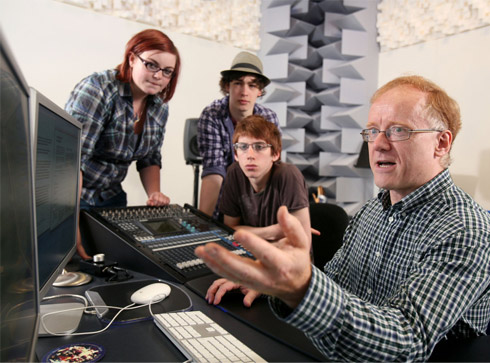Wired for sound
Fri, 16 Mar 2012 15:19:00 GMT
Professor Michael Clarke awarded £312,000 to research and recreate the classics of computer music

Professor Michael Clarke in the University's state-of-the-art SPIRAL Lab
THE impact of electronics on the course of modern music is to be assessed in a £312,000 project headed by the University of Huddersfield’s Professor Michael Clarke. The research must happen now, he says, because many of the first composers to work in the field are ageing – and so is much of the technology that they used to create their key works.
The money has been awarded by the Arts and Humanities Research Council. When the 30-month project is completed, a book will appraise and interpret the work of key composers who have harnessed computer technology and electronics over the past six decades. Also, there will be a software package that enables users to explore and recreate some of the pioneering compositions in the field of electronic music.
“Over the last 60 years, more and more composers have been working with technology,” said Prof Clarke, a composer himself. “What we want to do is look at the way in which that technology has opened up new possibilities for composers creatively and the way that technology has influenced their creative practice.
“We will try to decide if that technology has changed the way that at some composers think... or whether the technology is simply a means to an end which isn’t very different from what they were doing before.”
Professor Clarke is a former director of the globally respected Electroacoustic Music Studio at the University of Huddersfield. In 2011 he organised and chaired the prestigious International Computer Music Conference when it took place in Huddersfield.
His latest AHRC-funded project is conducted in tandem with Professor Peter Manning of Durham University and a research assistant is due to be appointed soon.
The project will probably focus on a period starting around 1980, when computer technology began to have a major impact on composition.
“Once we have selected which pieces we are going to look at we will be talking to the composers,” said Prof Clarke.
“We will also be looking at the music itself, studying the techniques that were used and trying t o recreate them, which is something I have done in my previous research Part of the project will be to recreate with modern technology the sort of approaches that were used, so that we can understand them better.
“The earliest generations of electro-acoustic composers are now getting very old, “ added Prof Clarke, “so we need to act soon to have access to them and their equipment - also the studios they used and the people they have worked with .
“If this isn’t done in the near future something valuable will be lost for ever”.
As he prepares for his major new phase of research, Prof Clarke has seen a recent project come to fruition. He has devised software for an innovative DVD which explores the composition, rehearsal and performance of a string quartet by the composer Michael Finnissy.
Dr Amanda Bayley of Wolverhampton University had initiated the project and realised that Prof Clarke would be able to provide the expertise required to turn the DVD into a fully interactive multi-media package so that users could explore the creative process in enormous depth.
Entitled “Evolution and Collaboration”, the DVD, unveiled at a launch event in London, received funding from the Performing Arts Learning and Teaching Innovation Network.







